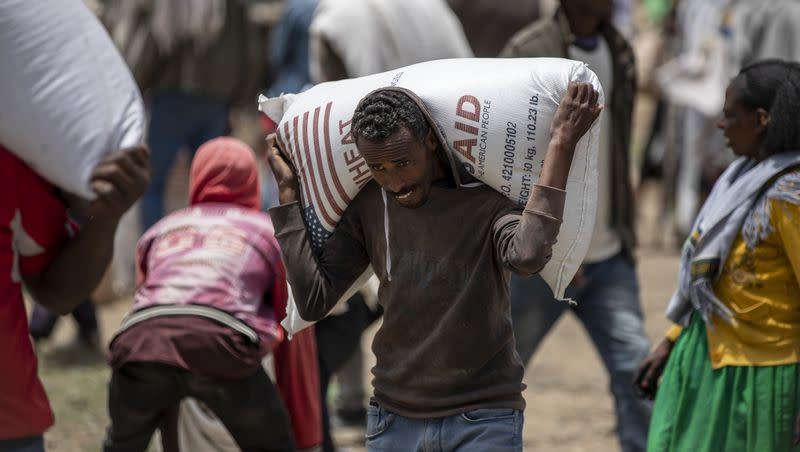USAID to resume food aid in Ethiopia after massive theft resulted in a monthslong suspension

Months after halting food aid in Ethiopia following a massive theft of aid by local officials, the U.S. Agency for International Development will restart aid donations in December.
In the northern region of Tigray, site of a brutal two-year civil war, 5.4 million out of a total of 6 million people rely on international food aid. Over 20 million in the country at large need assistance with food. The situation since aid was stopped earlier this year is dire. Some eat barely once a day. Others in a refugee camp told Washington Post reporters they had been forced to sell themselves in order to feed their children.
The Associated Press has verified more than 1,300 deaths from hunger in Tigray. Since a cease-fire between the Ethiopian army and Tigray forces was signed a year ago, hunger now accounts for more than two-thirds of all the deaths in the region.
What happened
On April 20, 2023, the World Food Program informed its humanitarian partners that it was suspending deliveries of food aid to the Tigray region because it had uncovered widespread theft. Less than two weeks later, the United States Agency for International Development said they were also suspending aid.
According to The Associated Press, the grain was stolen from the Tigray region, after fighting between government troops and Tigrinya fighters slowed in November and February.
From a single warehouse in Tigray, enough food to feed more than 130,000 people was stolen, then sold. Bags of grain still marked with the U.S. flag were found for sale in local markets, at prices out of reach for the people it was meant to help.
The theft of U.S. and U.N. food aid included the manipulation of beneficiary lists that the Ethiopian government has insisted on controlling, looting by Ethiopian government and regional Tigray forces and forces from neighboring Eritrea, and the diversion of massive amounts of donated wheat to commercial flour mills in at least 63 sites, a senior USAID official earlier told the AP.
After implementing some security changes, the World Food Program began aid distribution on a small scale in August and increased the number served in October. USAID officials, however, said at the time that they were not yet comfortable with the proposed changes. On Tuesday, officials announced that they were ready for a one-year nationwide trial period with newly agreed upon reforms.
Related
New safeguards
After months of “diplomatic engagement and negotiation,” USAID wrote in a press release on Tuesday that there had been “widespread and substantial reforms of the food assistance structure.” Those reforms will “fundamentally shift” Ethiopia’s food aid system, said Jessica Jennings, USAID spokesperson.
New security measures include GPS tracking of food delivery trucks and spot checks of grain warehouses and mill. USAID and its third-party monitors will also have unimpeded access to review sites throughout the country.
The World Food Program and the Catholic Relief Services will take over handling of warehouses, commodities and distributions in programs and regions formerly handled by the Ethiopian government, reports the AP. Drawing up lists of community members who need food will also be handled by aid agencies.
Additional safeguards include a photographic identity card for each household that will be scanned when collecting food, and no longer allowing one person to collect food for large groups of families, reports The Washington Post.
“USAID places the highest priority on taking every possible measure to make sure that U.S. humanitarian assistance is used for its intended purpose, reaches the most vulnerable, and ultimately saves lives,” said Jennings.
“Given the significant number of people in need of food assistance in Ethiopia, we are pleased these important reforms will allow the delivery of food assistance to those who need it most.”
Holly Richardson is the editor of Utah Policy

